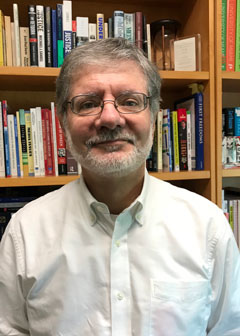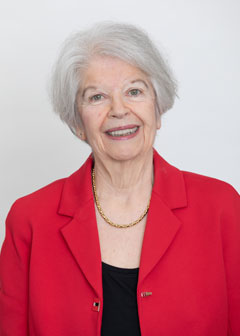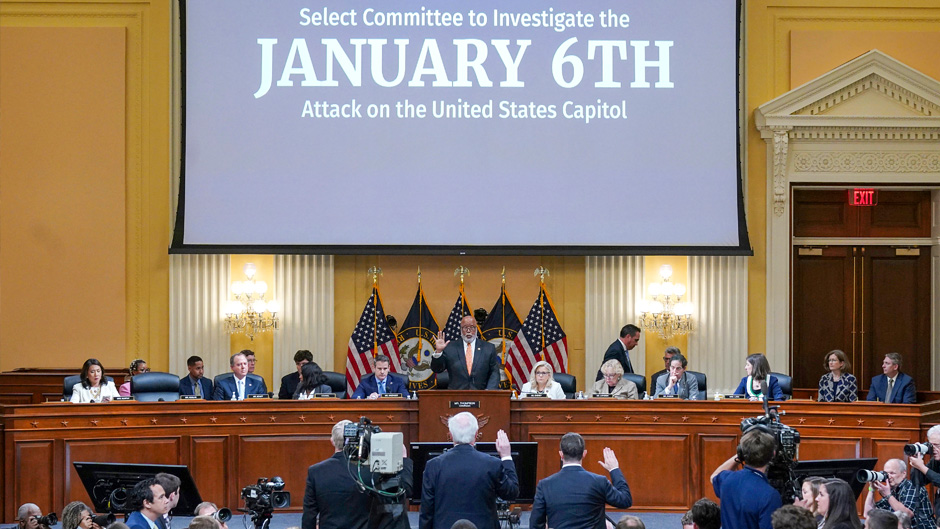Sam Terilli, associate professor and chair of the Department of Journalism and Media Management at the University of Miami School of Communication, and Frances Hill, professor in the School of Law and Dean’s Distinguished Scholar for the Profession, examined the parameters of the House Select Committee and assessed its efforts to hold accountable those responsible for the attack Jan. 6 on the Capitol.
Terilli explored the challenges of trying to engage a polarized and media-fragmented public with such a massive story—11 months of testimony behind closed doors, 1,000 witnesses, and review of more than 100,000 documents—through the series of public hearings that began June 9. A fifth hearing was held June 23, with a sixth surprise hearing held on Tuesday that featured testimony from Cassidy Hutchinson, an aide to former Trump White House chief of staff Mark Meadows.

“It’s a completely different media landscape from the time of Watergate—the 1970s hearings that some have compared this to,” Terilli said. “There are far more media outlets with networks, cable, and social media—it’s a new age of trying to penetrate viewers and, more importantly, voters.”
Terilli highlighted what he called the production values the committee has employed to try to meet that challenge.
“The videotaped presentation and unseen footage have all been meant to captivate, and it did captivate those who were watching,” he said, noting that “a video is far more engaging than someone reading a transcript.”
Most congressional hearings are often interrupted by legislators seeking to make their partisan points, Terilli pointed out, yet these hearings are more streamlined with members from both parties more intent on developing a cohesive narrative. He added that questions appear to be well-focused and thoughtfully conceived.
“It’s not by accident—and all of this is an acknowledgment of the demands of telling such a story today and how much our attention spans have changed,” he said.
The committee’s approach and production to date have been as effective as they possibly could be, yet Terilli suggested that the pivotal question is whether the narrative is reaching its intended audience.
“My hunch is that the parts of the potential audience—the voting public—most likely to pay attention are engrossed already,” Terilli said. “Either they’re the voters who most likely take these allegations very seriously, or they’re those who are confirmed believers in either Donald Trump or in conspiracy theories, and those who believe that this committee is just a partisan hack job—and so are not likely to pay attention no matter what the committee does or says,’’ he added.
“Yet there is a second audience—some people in the middle, a little to the right or to the left of center, who can still be persuaded and might have an open mind and listen to a factually well-reported and well-told narrative,” Terilli continued. “It’s a sliver, maybe only 5 to 10 percent—and that might be overly optimistic—but that’s ultimately the audience the committee is striving to reach.”

Hill, a constitutional law expert, downplayed comparisons to the Watergate hearings—“most people were not even alive then to remember”—and emphasized instead the motivation and model for the hearings, bicameral [both House and Senate] and bipartisan [representation from both parties].
“In the immediate aftermath of the attack, there was anger and outrage on both sides. This was after all their building and their workplace that was trashed and their representatives who were targeted,” Hill said. “So, there was the question of how this could have happened and what was needed to prevent it from happening again.”
Hill highlighted that both the House and Senate have established rules and the ability to convene a committee to investigate. Either an existing committee can be assigned the authorization or a new select committee can be created, as in this case. A certain amount of evidence and agenda to proceed is needed, and both chambers must vote to approve.
While congressional hearings may reflect partisanship, they are ultimately geared to discover and disclose evidence for the good of the country and protection of its ideals.
Hill noted the Benghazi hearings that surfaced in advance of the 2016 elections and focused on testimony from then Democratic presidential candidate Hillary Clinton.
“We had diplomats who died, it was tragic and upsetting—though the idea of blaming it on one person seemed a bit of a stretch at least to some—but there was a vote to find out what went on, to learn from it, and avoid that it might happen again,” Hill said.
Noting the House committee is limited to investigating, Hill said she is nonetheless fascinated by the scope, composition, and comprehensive approach they have undertaken.
“It is true that they don’t have the right to issue an indictment, yet no one can tell them what questions to ask,” she said. “And there is a humongous staff—and if you’re going to interview a thousand people you need that,” she said.
The staff includes experts in civil and criminal procedure, constitutional law, and based on recent developments regarding the alleged misuse of political structure or office, tax experts, she pointed out.
Hill referred to a range of charges that Justice Department prosecutors could potentially pursue as a result of evidence unearthed from the hearings: sedition, crimes involving conspiracy to obstruct an official proceeding or defrauding the United States, and fraud or other economically based crimes associated with public officials.
“It’s turning out that there is a lot of evidence that we never dreamed we’d have that we now have,” Hill said, adding that she has been fascinated by the “misinterpretation of intent,” a critical law point, but one that has been exaggerated on television shows involving lawyers.
“They’ve already shown all the intent they’re going to need on various charges—intent has become something less of this great omnipresent defense that can be invoked in every case, but intent does not mean clairvoyance,” she said.
Whatever outcomes surface, Hill surmises that the hearings will continue for a while, possibly even past the November elections, and that the committee’s work is far from over.
“They have interviewed a thousand witnesses and apparently more and more people are calling up the committee saying, ‘I’d like to come forward and share what I know,’ ” Hill said.
“For many people, it’s an excruciatingly difficult set of situations: Nobody wants to go to jail, nobody wants to turn in their friends, and nobody wants to blow up the idea of executive privilege. They just don’t want it misused,” she said. “And knowing whether it’s being misused is not at all easy to determine.”
Ultimately, the committee would issue an executive summary of about 200-400 pages and a report of its findings, according to Hill.
“I can’t imagine how big that’s going to be and to make sure it doesn’t have internal contradictions—it’s a massive and daunting undertaking because, if not considered from every angle, some inexcusable error is going to be made,” she said.
Terilli recognized the committee’s challenge to convey the narrative and engage the public. He was heartened by an experience last week when he visited a local car repair shop where the hearings were airing on the television.
“These guys were watching and listening to one of the witnesses say that he just wasn’t going to violate his oath as a public servant,” Terilli recounted. “I don’t know their politics, but these guys just shook their heads. They found it all to be stunning and proceeded to discuss some of the allegation of the facts that have been unearthed.”

